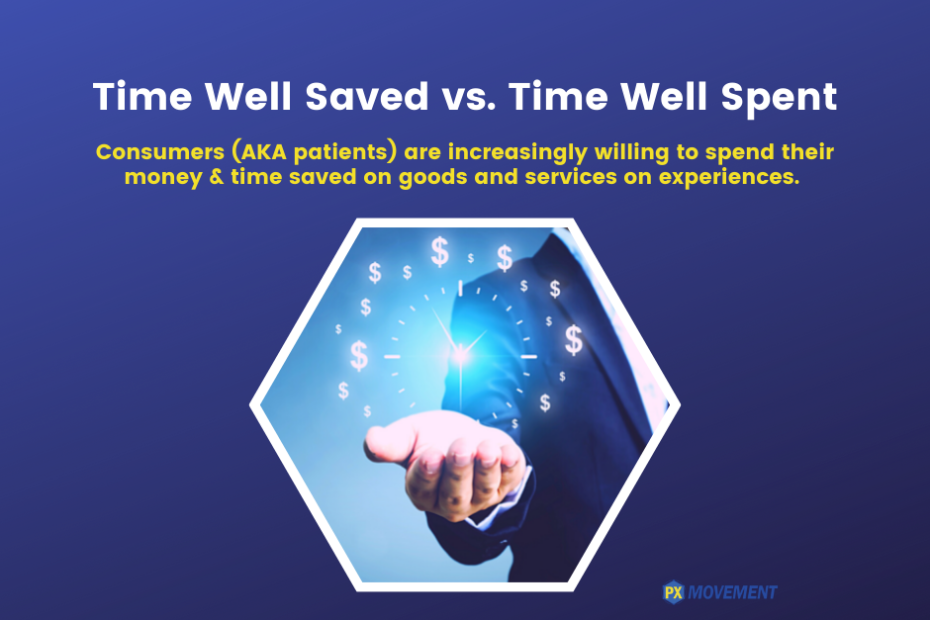Consumers Are Willing to Pay for Experiences
The “Experience Economy”
In the Experience Economy (a term developed by authors Pine and Gilmore to describe the evolution in society of what we value as consumers), there is a saying that “time is the currency of experiences.”
Understanding the difference between services and experiences is key to making positive changes in terms of the experience. We pay for services – getting other people to do perform activities on our behalf – as a means of saving time. Very few of us change the oil in our car, for example. It’s faster and easier to pay someone else to do it for us. At this time of year, many of us have someone prepare our taxes. Just think about how you spend your day. You’ll soon recognize the many ways we participate in the Service Economy.
Time Well Saved
While it still takes time to engage others in performing these services, it’s a fraction of the time we would spend on the same activities ourselves. This frees up your time to do other activities that you value more highly. This is what we mean by time well saved.
We increasingly look to save money on these services that comprise everyday life. We pay attention to how much we pay for dry cleaning, lawn care, and cell phone service. As the quality of these services becomes harder to distinguish, we tend to make purchase decisions based on price. This effect of commoditization is what society has previously seen in purchases of physical goods. Ready availability and improved quality have made it much more difficult to distinguish one being better than another. Just start shopping for an air fryer and you will understand.
Time Well Spent
What do people do with this extra time (and money) saved on goods and services? They save to invest in experiences. As described in last week’s blog, people are willing to pay for experiences they used to have or obtain for free. The tour guides we had on a family trip to Europe a few years back made the vacation infinitely better. Whether you recognize it or not, the landscape has changed in terms of competition for the consumer’s discretionary dollar. More and more industries are focused on designing and delivering an outstanding customer experience. Consumers are willing to pay more for better experiences. This is what we mean by time well spent.
Every doctor who is a business owner should know that patients are continuously in search of a better medical office, exam, and surgical experience. There is a massive opportunity here to differentiate core medical services with additional elements that make for a more meaningful and personal experience. Beyond Bedside Manner is designed to help stimulate thinking and action in this regard. There is every reason why going to the doctor can be much improved in terms of what happens “door to door” — from the time patients arrive to the time they leave.
Time Well Spent at Your Medical Practice
The key metric in the context of medical visits: you want patients saying “that was time well spent.” Having patients wait to be seen or fill out volumes of paper when they arrive is not time well spent. It’s literally a waste of time…as well as an opportunity. That time can be put to better use educating patients, having paperwork completed in advance, and employing technology to alert patients if there’s a delay in their appointment start time. Each of these shows patients that you respect and value their time as much as yours.
This same idea can and should be applied to employees. I heard Joe Pine reference a survey indicating that only 16% of employees are fully engaged in their jobs and roles. If that’s true, then over 80% of the labor force is working for a paycheck. This too becomes a ripe opportunity to help medical practice employees by looking at tasks performed and asking, “is that time well spent?” Many employees don’t complain about performing certain tasks simply because they may not be aware of a better way of doing them. It’s management’s responsibility to seek more efficient ways of getting certain jobs done. In one practice I work closely with, the front desk did a daily financial reconciliation via spreadsheet. It had to be checked for errors and often corrected due to typos. We started by improving the spreadsheet, which was a relief to the team. We continued by automating this step using better software, which showed the team that we respect their time and want it spent on higher-value activities.
As you look at your work environment, the people who perform tasks as well as the people they serve, where can you find opportunities to improve the use of time?

